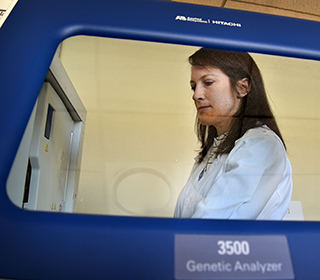Latest News Archive
Please select Category, Year, and then Month to display items
![]()
After South Africa’s battle with the record-breaking drought of 2015, Prof Andries Jordaan from our Disaster Management Training and Education Centre for Africa(DiMTEC) saw room for improvement in dealing with this kind of disaster.
Drought impact
Commercial farmers who are usually net exporters of food crops and communal farmers who own the bulk of the country’s livestock, were all hit hard in 2015. Most of the latter had no resources to spare as the drought progressed. The concern about the drought’s impact on the country’s food production and availability resulted in a joint goal of preventing food scarcity during future droughts.
Prof Jordaan’s visit to the National Drought Mitigation Center (NDMC) in Lincoln, Nebraska, in the US, several years ago prepared him to better equip communities in South Africa to deal with drought situations. “I recognised that in spite of the impact DiMTEC has been able to make on disaster preparedness, a gap remained in disaster response in South Africa.”
Sharing knowledge
In August this year Prof Jordaan again visited the NDMC. This time he requested a few key players in South Africa’s agriculture and disaster response communities to join him. With him were Janse Rabie, head of Natural Resources at AgriSA, a nonprofit organisation that functions as an interface between the government and about 28 000 South Africa farmers, and Moses Musiwale Khangale, director of Fire Services for the South African Ministry of Cooperative Governance and Traditional Affairs.
The South African delegation met with and learnt from climatologists, geospatial technologists, and outreach and planning analysts.
New Division of Virology to deliver crucial services for HIV diagnosis and resistance testing
2015-12-14

The establishment of a Division of Virology within the Department of Medical Microbiology, under the joint auspices of the UFS and the National Health Laboratory Service (NHLS), reflects the continued growth within Virology. Dr Dominique Goedhals, Head of the Division, says the division will also provide training of undergraduate medical students, medical technologists and technicians, and registrars. |
The newly established Division of Virology at the University of the Free State will be one of only five laboratories in the country to be involved in crucial diagnostic and testing services for HIV viral load monitoring, early infant diagnosis, and HIV resistance testing.
The Virology Diagnostic Laboratory serves as the reference laboratory for all HIV National Priority Programme samples for the Free State and Northern Cape provinces.
Medical staff at the laboratory will provide a 24-hour consultative service, as well as outreach programmes to district laboratories in the Free State and Northern Cape where pathologists are not available.
Dr Dominique Goedhals, Head of the Division of Virology, says this division, under the joint auspices of the UFS and the National Health Laboratory Service (NHLS), reflects the continued growth within Virology.
The division will not only deliver this critical diagnostic service, but will also focus on training and teaching, as well as research.
Teaching and training activities include teaching of undergraduate medical students, medical technologists and technicians, and registrars. The postgraduate science programme has a high output of honours, master’s and doctoral students in Virology. The intern medical scientist programme is also active, with five interns having successfully submitted their portfolios since the programme was implemented in 2010.
Research activities under the Head of Research, Prof Felicity Burt, have also expanded and continue to show increases in publication output and acquisition of grant funding. Established research groups within the Division of Virology focus on vector-borne and zoonotic viruses, human papilloma viruses (HPV), and human immunodeficiency virus (HIV), as well as work with a number of international collaborators.